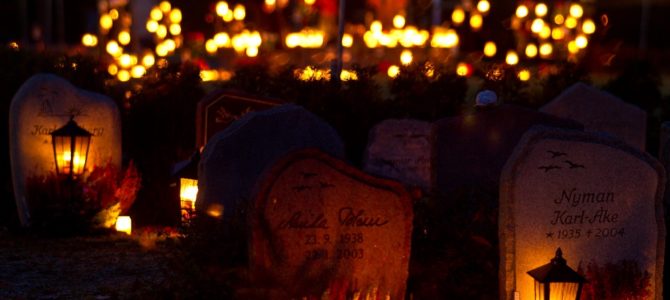
Christians, it’s time to have a heart to heart about the way we’re letting pagans claim our celebrations. For too long we’ve let the secular world redefine our traditions, rewrite history, and steal our holidays. It’s time to put a stop to it.
Halloween is a sad victim of this revisionist attack on Christianity. Some would have you think that this day is passed down from ancient times, steeped in pagan lore, sacred to civilizations lost to time. That it’s worldly and cool to trick or treat, visit terrifying and over-the-top haunted houses, and Christians need to mind their own business about how grotesque the day’s observances can get.
After all, what do lame, prudish Christians even know about fun or Halloween? Nothing, right?
This isn’t the truth, though. Christians used to do Halloween far better than pagans, and it’s not too late for Christians to remember this and start taking Halloween back.
Instead of being some form of stolen Druid ceremony, Halloween has a long, deeply traditional path through Christianity and the Bible itself. Extra-biblical texts reference the tradition of remembering the dead, too, such as the “Martyrdom of Polycarp,” a work discussing the death of a church father from the second century.
“There whenever we can gather together in joy and happiness, the Lord will allow us to commemorate the birthday of his martyrdom, both in memory of those who have already engaged in the struggle and as a training and preparation for those who are about to do so,” it says.
The early church didn’t shy away from the idea of dying in and for the faith. Early Christians understood the sad truth that they could, and often would, die for their beliefs, and recounting the stories of fellow martyrs served as an encouragement and an opportunity to strengthen the hearer’s faith. It makes perfect sense that they would remember the deaths of their loved ones and notable figures in Christianity.
Christianity has long celebrated a holiday commemorating the saints who have gone before us: All Saints Day. All Saints Day (or All Hallows Day, where the name Halloween comes from), starting at sundown on October 31. Those familiar with either the Old Testament or Judaism will recognize the start of the feast coming at sunset.
The day itself is filled with church, remembering faithful Christians who have gone before us into Heaven and are sorely missed, and spending time with loved ones who surround us in this life. The trick or treating that we still see today goes back to when children in medieval Europe (1300-1500) went door to door, asking for food or other gifts in exchange for prayer.
There’s obviously nothing pagan or evil about children praying, and attempting to link this to Samhain is misguided at best, and dishonest for those who do due diligence. The honest weight of historical records rests with these being Christian traditions, and not even from Celtic areas. These are not derivatives from Samhain and never have been.
It is vital to note at this point that before the 20th century Samhain was not a festival of the dead. Extensively sourced research shows rather that Samhain entered the picture significantly after All Saints and All Hallows—by centuries, and in completely different parts of the world. If anyone has coopted a celebration and a tradition here, it’s not the Christians. Clear, repetitive evidence shows quite the opposite.
We have records of church fathers and historians like St. John Chrysostom, who lived in what is now modern-day Turkey, talking about a festival to remember those who died in the faith. Chrysostom’s reference to this traces back to 407 AD. Records also discuss a church father from Syria referring to the same idea in the mid-300s. Isidore of Seville, from what is now France, had a liturgy made specifically for All Souls Day tracing back to the early 600s. You’ll note that none of these church fathers were Celts, so couldn’t have been stealing ideas from the Druids.
The date of All Hallows traces to Pope Gregory III, who was pope from 731-731 AD, who set the date firmly on November 1. Records also place All Saints on this date, for these reasons, in Charlemagne’s reign from the late 700s to his death in 814 AD.
Through the middle ages, through the Reformation, through the centuries that followed, churches including the Catholic Church, the Orthodox Church, the Anglican Church, the Lutheran Church, the Methodist Church, and the Presbyterian Church, all have commemorated All Saints Day and All Hallows, with variations based on their faith traditions. It’s not fringe or weird to say Halloween is a Christian day, despite what the last few decades have tried to do to it. It’s a Christian holiday, celebrated worldwide across broad traditions of the faith.
Worldwide, many cultures celebrate alongside All Hallows, with remembrances of their loved ones gone before. Dia de Muertos in Mexico pulls in some similar themes of remembering the dead, also with no ties to Samhain. Todos los Santos (All Saints) in the Philippines brings together families to remember their loved ones, too.
Despite the sad lack of evidence, claims that Samhain is the real holiday and All Hallows or All Saints is the interloper persist. It’s a shame, too. What’s the richer, more worthwhile tradition here: An evening of terror, weird lawn decorations, and haunted houses that revel in freaking you out? Or an opportunity for children and families to go door to door, interacting with neighbors, putting away for at least one evening the superficial lives we have adopted because of social media?
Re-embrace the importance of prayer, the wonder of attending church, of remembering all of those family members and friends who have gone before you in the faith—and because of that faith, you will see again. No shallow, worldly Halloween celebration can compete with that.
Embracing historic faith and feasts linked with it doesn’t mean losing out on fun or celebrations. Rather, it means the very opposite. A traditional Christian faith life embraces fun and faith, all at the same time. Take back Halloween. It’s time.









